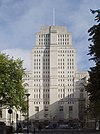This is an old revision of this page, as edited by 62.255.32.14 (talk) at 09:40, 29 April 2005. The present address (URL) is a permanent link to this revision, which may differ significantly from the current revision.
Revision as of 09:40, 29 April 2005 by 62.255.32.14 (talk)(diff) ← Previous revision | Latest revision (diff) | Newer revision → (diff)| The neutrality of this article is disputed. Relevant discussion may be found on the talk page. Please do not remove this message until conditions to do so are met. (Learn how and when to remove this message) |
King's College London Students' Union (KCLSU) is the second oldest in London, founded just after University College London Union. The current Strategic Plan defines the purpose of KCLSU as "Student Life Support".
History
KCLSU has a long and murky history with records being piecemeal or in the memories of current and past Union officers. The most famous President of KCLSU was Sir Ivison Macadam who was President in 1922 and became the first President of the newly merged National Union of Students.
KCLSU Services and Facilities
The primarily role of KCLSU has always been that of student representation and advocacy. The Academic Advice service provides much of the individual advice and representation to students, while the democratic structures enable the Union as a whole to express an opinion on almost any matter. However, like other students' unions, KCLSU does not affiliate to any political party or religious group.
KCLSU also provides almost all the sports clubs, societies and volunteering opportunities available at King's with over 50 sports clubs, 60 societies and a thriving student-led Community Action project. In 2003-04, King's came top in the University of London Union overall sporting leagues and the medical school (which, like others, are permitted their own, separate teams) came third, showing the dedication to sporting excellence in London.
In recent years, KCLSU has waxed and waned as a service provider as the numbers of students at King's increased due to the various mergers of different colleges, but also as the spending profile of students has changed with the introduction of tuition fees in 1997, a drive towards a healthier lifestyle and now with the introduction of top-up fees in 2006-07. Following the closure of the student bar at St Thomas' Hospital in 2005 due to Health and Safety reasons, KCLSU currently operates two bars, two nightclubs, three coffee shops and convenience stores, and a gym.
Union Governance
The governance of KCLSU has changed little in its history, featuring a proportionally elected Student Representative Council (similar to a 'parliament' with a 14-strong directly elected 'cabinet', known as the Executive Committee who are also the Trustees of the union. Five Executive Officers are full-time, taking a 'Sabbatical year' year either at the end or in the middle of their degree.
The Executive are charged with carrying out the day-to-day running of the students' union, but are in fact supported by 35 permanent staff and over 200 student staff who make up a civil service headed by the General Manager, who acts as a Chief Executive, reporting to the Trustee board.
2004 Governance Review
In 2004, KCLSU launched the most ambitious, wide-ranging and grassroots review of student union governance in modern British students' unions. For the first time, a management consultant (formerly a General Manager himself) and the leading firm of charity lawyers worked together to truly examine the nature of the legal relationship between the College and the Union, where the responsibility lay and how best to serve the interests of students. The report was published in early 2005 and suggested a set of proposals that would truly reflect the balance of responsibility and authority within the students' union.
One key proposal involved a slimmed down Trustee board, including non-sabbatical student Trustees and part-time non-student Trustees, in a ratio of 2:1 students and non-student and 2:1 part-time and full-time was proposed, with complete Executive power vested within them. The fallacy of the Student Representative Council being the ultimate decision-making body could not be continued as it was incompatible with how the Union actually operated and also Charity law.
The role of the part-time Executive Officers, who in the main held portfolio roles, was not envisaged within the new Trustee board, which would meet far less frequently than the Executive presently does (on the order of months between meetings, rather than weeks). This would help the Trustees focus on strategic decisions, rather than get bogged down in operational detail, which ought to be left to the permanent staff. However, the creation of more "standing committees" or groups that are able to operate and campaign with less regulation and central bureacratic interaction was approved and the Chairs of these committees would take over the main role of what the part-time officers currently do.
Due to the current lengthy legislative process that is needed to approve a change in the Constitution and Regulations of KCLSU (on behalf of the Union and the College), the documents that are the ultimate governing tools, the new governance proposals will be implemented over 2005-06 with elections in Spring 2006 for the new system to begin operation on 1 August 2006, for academic year 2006-07.
Current KCLSU Officers
| Position | Office | Name |
|---|---|---|
| President | 2004-2005 | Michael Champion |
| VP (Education & Representation) | 2004-2005 | Rajesh "Josh" Joshi |
| VP (Student Activities) | 2004-2005 | Benjamin Philip |
| VP (Media & Publications) | 2004-2005 | Samantha Williams |
| VP (Sites & Services) | 2004-2005 | Lee Peterson |
